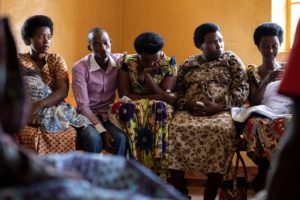
The first time I met Theresa was in March this year. I was visiting Network for Africa’s trauma counselling project in Rwanda, preparing for a more in-depth trip in June. I wanted to see how Network for Africa and its local partners were reaching survivors who remain deeply affected by the 1994 genocide.
Back in March, Theresa (not her real name) was pregnant. She spoke about how she had been down to the river recently, intending to drown herself, and was stopped by some local people. When I returned this month, I found her smiling. I was astonished by the transformation, and she offered to tell me her story.
She told me she gave birth to her third baby on 18th April. But then she had a mental health crisis and was taken to a mental health clinic. Her baby was removed from her, just as the previous two had been. In her extreme distress, Theresa had tried to feed the baby banana leaves when it was one day old. Later, I learned that all three of her babies were the product of rapes that had occurred while she was struggling with traumatic episodes. To this day, Theresa doesn’t know who the fathers of her children are.
When I listened to her story, I wondered if the crisis was linked to the fact that the baby was born soon after the national events commemorating the genocide that began on 4th April. It’s a hard time for everyone in Rwanda; I can’t imagine bringing new life into the world with the same breath with which you cry for those who have been lost.
Bringing People Together
And yet, Theresa is now smiling and happy. When I asked why, she explained that since she has been attending the group counselling sessions, she has friends who are taking care of her. Someone in the therapy group recently gave her 1,000 RWF (equivalent of £5 or $7) to buy some essential items. Her face shines with joy as she says that people come to see her regularly. If you have visitors, it means you are someone worth visiting.
Although Theresa would one day like to raise her children, she knows that her priority is taking her medication and attending counselling. Her destination will be determined by God, she says, because God is the one who created her, and God will give her direction.
It’s difficult to hear and tell Theresa’s story. It’s hard to think of anything positive to put on the same page as the word ‘rape’. But here is what feels different: this time, Theresa has hope. In the Rwandan countryside, community is not just something that makes the survivors feel less alone: it is an intrinsic part of survival. If you didn’t finish school because of the genocide, and you don’t have a house, it is your community on whom you depend for survival.
And the work that they do in the counselling group is just the beginning. It’s the pebble in the pond, getting them in a room together and guiding them to see each other as family. The rest of the work ripples out from the survivors themselves – Rwandan communities, once they start working together, are incredibly organized. Many groups have started their own joint bank accounting system: each time the group is held, everyone participating donates one 100 RWF coin (approx. 10 cents) and the money is held there for future ventures that might benefit the group. If someone wants to start a small business, for example, a loan is provided with low interest. The group recognizes that their collective mission is to lift each other in the pursuit of a better life.
As someone raised in the West, I am quick to reject group counselling, disliking the idea of baring my soul in front of strangers. But here, in Rwanda, it is getting people who live alongside each other to sit in one room together, giving them a place to see that in their unique and traumatic experiences (that frankly others can never fully understand) they can stand united, not divided.
Our thanks go to Chrystal Ding for writing a second newsletter for us. Chrystal is an Artist, Photographer, and Writer currently working on a project with genocide survivors with the support of the Rebecca Vassie Memorial Award 2019.